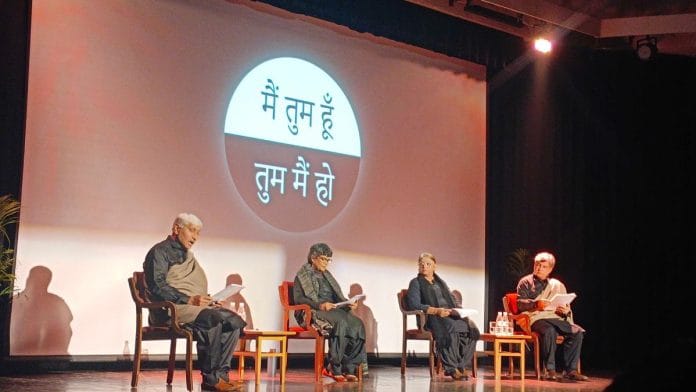New Delhi: Partition stories don’t just portray the massacre it brought upon thousands of people but also the varied ways they respond when faced with such situations, said Delhi University Professor and panellist Apoorvanand. Five such stories were recently staged at the CD Deshmukh Auditorium in Delhi.
The performances were based on the writings—poetry, prose, and anecdotes—of prominent Hindi writers Mohan Rakesh, Bhisham Sahni, Krishna Sobti, Agyeya, and Yashpal. Their stories, including Malbe Ka Malik, Amritsar Aa Gaya Hai, Sikka Badal Gaya Hai, Sharandata and Badala, powerfully reflected the emotional and historical upheaval of Partition. The event featured dramatised readings and enactments by a talented group of performers: Alka Ranjan (editor), Apoorvanand, Purwa Bharadwaj (writer), Raza Haider (designer), and Yusra Naqvi (history student at DU).
“We are always told that Partition should never be forgotten. However, at this moment, it is crucial to reflect on how we remember Partition and what lessons we draw from it. These five stories not only portray the massacre and sorrow of 1947 but also capture the human response in an incredibly profound way,” Apoorvanand told ThePrint.
The event, titled ‘Main Tum Hoon, Tum Main Ho’, began with a train journey from Bhisham Sahani’s story Amritsar Aa Gaya Hai. The story is based on the experiences of people travelling from Pakistan to Amritsar in India during the Partition. One of the main characters, Babu, remains silent as the train passes through Pakistan. He quietly observes a Pathan preventing anyone from entering the coach. The Pathan even strikes a Hindu family attempting to board the train. However, as soon as the train enters India, Babu’s behaviour changes, and he becomes more assertive. He shouts at the Pathan and prevents any Muslim from entering the coach.
“The story highlights the shifting dynamics of power and human nature when one feels safe. People begin to justify violence with violence, forgetting that it only causes harm to another human being,” said Apoorvanand.
The auditorium was packed, and some people even sat on the floor to listen to these stories. This shows how they still have a profound impact on people today.
“All five stories selected for the event depict different human emotions and reactions, demonstrating that there is always a possibility for human resilience in times of crisis,” said Purwa Bharadwaj, another panellist and the scriptwriter of the show.
The next story Sharandata depicted how two individuals within a Muslim family reacted to the same situation. While harbouring a Hindu escaping riots in their home, the patriarch of the family tries to poison him. The daughter helps him escape to a better life.
Also read: Sindhis have been missing in India’s Partition story. Now, they finally get an exhibition
Amritsar to Aligarh
What would happen if you suddenly had to leave the place where you’ve spent your entire life? How would it feel if those you’ve always helped forced you to leave your land? Krishna Sobti’s story Sikka Badal Gaya Hai portrays these emotions.
Human values, such as empathy, compassion, and resilience, are vividly reflected in Hindi literature, particularly in the context of the Partition.
“The best way to express and explain any matter is through literature. And if we want to make today’s generation aware of the truths of 1947, these short stories are the best medium for it,” said Bharadwaj.
The next story, Badala, is a still relevant portrayal of ‘silent hate’. It too is about a train journey. It begins with a Hindu passenger repeatedly trying to provoke a Sikh traveller by claiming that Muslims have committed various atrocities against Sikhs, including raping their women.
“Many times, people harbour hatred but don’t show it. But when they find even a small opportunity or a safe space, they express it all,” said Bharadwaj.
In the story, the Sikh man’s response changes its trajectory. In anger, he says, that if we answer hate with more hate, only humans will die. “True revenge is when you prevent such violence from happening.” Saying this, the Sikh man takes it upon himself to safely escort the Muslim woman, sitting in front of him, to Aligarh.
“Today, violence has become a fact of life, and we are slowly forgetting that both the perpetrator and the victim of violence are human beings,” said Apoorvanand.
The event, which started with “Amritsar aa gaya hai” ended with “Aligarh aa gaya hai”. And this journey from Amritsar to Aligarh paints a bigger picture.
(Edited by Theres Sudeep)






